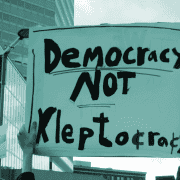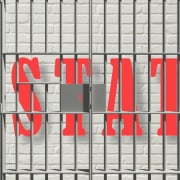|
Getting your Trinity Audio player ready...
|
By Mzukisi Qobo
First published on Business Day
In 2022 Corruption Watch celebrated a decade of existence. This milestone coincided with the release of the six-volume Zondo state-capture commission report, which detailed the extent to which public officials abused their positions to engage in or facilitate corrupt activities. It also cast a spotlight on how corporates were active agents in furthering state capture.
State capture is an elaborate process of weakening controls within the state and its various organs, enabled by senior public officials, to repurpose state institutions as avenues of theft on a grand scale. This destructive project has been in motion for at least a decade. As a form of corruption that represented collusion between the top echelons of government, private individuals and private sector firms, its origins can be traced to the Jacob Zuma era.
Corruption Watch was established in 2012 amid a public outcry over growing corruption in the state. As a movement of civil society, trade unions and business leaders, it aimed to stem the tide of corruption through advocacy and, over time, litigation and thought leadership. The organisation is proud of its record: it has placed corruption under the spotlight, creating broader public awareness of its dangers.
Those dangers are still very much with us. While the Zondo commission may have wrapped up its work and released its report, the ghost of state capture remains. Its legacy is visible in the chronic electricity blackouts South Africans suffer, which have wrought destruction on businesses, worsened unemployment and soured the public mood.
As a legacy of corruption the country’s public finances are strained, in no small part because of the resources that must now be directed towards fixing the problems created by years of state capture, especially to clean up Eskom’s debt of more than R400-billion. The finance minister’s 2023 budget vote was largely about absorbing half of this debt into the fiscus, which means the diversion of resources from activities that could enhance growth and strengthen social resilience and fixing errors of the past.
State capture is visible in the potholes that have disfigured roads across South Africa, the hospitals that are dysfunctional, schools with inadequate infrastructure, erratic provision of water services, intra-community tensions over limited resources and opportunities, and police who lack the resources required to do their work effectively, placing the lives of ordinary citizens in danger.
Accelerating justice is an urgent imperative
The maxim “justice delayed is justice denied” is now more pertinent than ever. If we are to put the brakes on corruption and the degradation of our state and country we must accelerate the dispensing of justice for the perpetrators of corruption and those who are victims of it.
Corruption Watch will be doubling its efforts to push back against the scourge of corruption. The next phase of our work will focus on pressing for radical change in how public institutions work, how they serve the public, and how public officials relate with an array of social actors, including civil society and business.
We will be insisting on greater accountability by our public officials. We will also place under intense scrutiny those individuals — rather than only institutions — implicated in the Zondo report who still serve in various capacities in the state.
Crucially, we will offer ideas and perspectives on what can be done to accelerate efforts to combat corruption — including the urgency of implementing the recommendations of the Zondo commission, rebuilding broken institutions of state that are vital to the fight against corruption, and promoting social renewal and resilience.
Corruption undermines human dignity. It diverts resources from where they are needed to improve the quality of public services towards serving the selfish interests of a few individuals. It also erodes public value and weakens the sources of inclusive growth.
We cannot take it as a given that state capture has been buried. More likely, it has metastasised and assumed new forms in spheres of government at national, local and provincial levels, as well as in state-owned enterprises and other organs of the state.
All are equal before the law
In the first instance, we require public officials to lead by example. The Phala Phala debacle entangling President Cyril Ramaphosa has the potential to weaken accountability. The work of the independent investigative panel was not given serious thought by the very parliament that appointed it in 2022 to investigate the matter. Parliament dismissed its conclusions and recommendations with little engagement with its contents. This failure highlights the risks of having a weak parliament that wilts in the face of the president and political party bosses.
Parliament abdicated its role in holding the president to account, even though the panel’s report raised serious ethical issues relating to Ramaphosa’s conduct in the wake of the burglary at his farm, the origins of funds and their purpose, the legal arrangements of the company that owns his farming business, the role played by the police in the aftermath of the crime, the possible abuse of power in state-to-state relations involving Namibian officials, and other yet to be investigated matters that may relate to potential money laundering and breach of laws governing foreign currency.
South Africa’s greylisting by global watchdog the Financial Action Task Force (FATF) once again emphasises the major challenge faced by the country in improving the integrity of its public institutions and developing robust measures to curb money laundering activities.
The FATF identified eight strategic deficiencies the country will need to address during its monitoring period. The most critical of these include issues related to timely access to accurate and up-to-date beneficial ownership information, sustained increase in law-enforcement agencies’ requests for financial intelligence from the Financial Intelligence Centre for money laundering and terrorist financing investigations, effective application of sanctions for breaches of beneficial ownership obligations, and improved risk-based supervision of designated non-financial businesses and professions.
Intensified activism and advocacy to come
South Africa is at a low ebb. The economy is significantly underperforming and projected to grow at just 1.4% in 2023; the official unemployment rate is unacceptably high at 32.7%; and the quality of public services continues to decline, compounded by electricity blackouts. However, we cannot afford to lower our guard; we must be more vigilant than ever.
As long as there are weaknesses in our system of accountability, Corruption Watch has a significant role to play as an anti-corruption watchdog and strong advocate for radical change in public institutions.
We will be more vocal and active going forward than ever before. We will be casting more of the spotlight on corrupt activities and individuals implicated in corruption. We will also proactively offer ideas and solutions for enhancing open government and demanding greater accountability, especially in public finance management, and pressing for enhanced integrity of the country’s public institutions. We will also exercise vigilance over private businesses that abuse the state for narrow ends.
We trust that our partners and the donor community will continue to work with us as we move to the next phase of our work in fighting corruption and rebuilding the foundations of ethical governance. Our recently released annual report is dedicated to the many unsung heroes who work hard to fight corruption in society, whistle-blowers who risk their lives to report wrongdoing, and the army of activists who work tirelessly at Corruption Watch.
Mzulisi Qobo is acting chairperson at Corruption Watch








